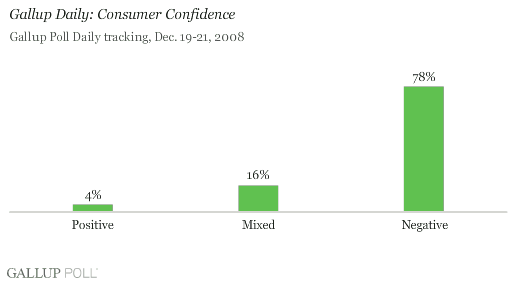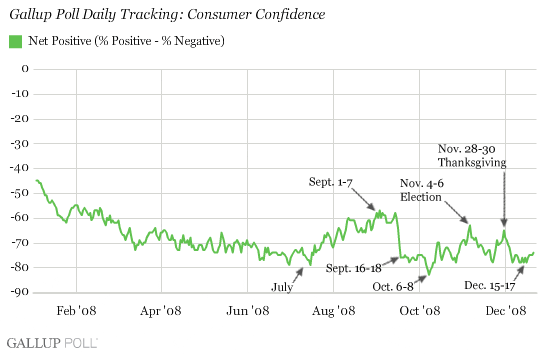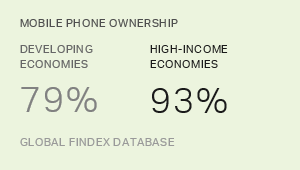PRINCETON, NJ -- The latest update of Gallup's , for Dec. 19-21, continues to show a very negative frame of mind on the part of the public. Seventy-eight percent of Americans can be classified as negative about the economy, and only 4% as positive, while the rest have consumer sentiments that can be classified as mixed. This yields a "net positive" value of -74 points.

Gallup's consumer confidence measure has been deeply underwater (i.e., the negative outweighing the positive) all year. The 2008 pattern has not been one relentless downward drift, but rather, a downturn, followed by an upturn, and then a crash back down. Unfortunately, after all has been said and done, Gallup's estimate of consumer confidence at this point remains near the low point for the year.

The consumer confidence measure began the year with a 61% negative rating, with another 16% positive and 21% mixed. That essentially marked the high point of 2008, with consumer confidence deteriorating steadily through the first six months of the year. Confidence then began to recover through August and into September.
But on the heels of the massive credit crisis that began to dominate the news in mid-September, consumer confidence took a major nosedive about Sept. 16. Confidence has stayed particularly low since that time, with two notable exceptions. Americans became more confident around the time of the Nov. 4 election, and again around Thanksgiving. These trends suggest that there is more to consumer confidence than a straightforward reflection of economic news and economic indicators. Holidays and other events can influence it.
Some of the uptick at Thanksgiving could be the result of a coincidental increase in the stock market that week. But the Thanksgiving "bump" could also indicate there will be a similar uptick in consumer confidence in the holiday period encompassing the last two weeks of December, the first vestiges of which may be happening now. But this uptick could be misleading if it is misinterpreted. If Thanksgiving is a guide, there is a good chance that any increase that occurs as a result of holiday periods will soon fall back down.
One obviously significant key will be the direction of consumer confidence after Jan 2. Will consumer confidence sag to new lows after the new year begins, or will it begin to recover? Any boost in confidence as a result of the holidays will be over. President-elect Barack Obama's inauguration will be in the near distance. At this point, there has been no apparent impact that can be directly attributed to Obama's efforts to focus on the economy -- including cabinet picks, announcements of planned stimulus plans, and the like. It is possible, of course that any positive impact of the new administration will not be apparent until Obama actually takes office on Jan. 20. But so far, his election does not appear in and of itself to have wrought highly positive benefits.
Survey Methods
For the 优蜜传媒Poll Daily tracking survey, 优蜜传媒is interviewing no fewer than 1,000 U.S. adults nationwide each day during 2008. The consumer confidence questions are asked of a random half sample of each day's interviews, and for any given three-day rolling average of results, consisting of approximately 1,500 interviews, the maximum margin of sampling error is 卤2 percentage points.
Interviews are conducted with respondents on land-line telephones (for respondents with a land-line telephone) and cellular phones (for respondents who are cell-phone only).
In addition to sampling error, question wording and practical difficulties in conducting surveys can introduce error or bias into the findings of public opinion polls.
